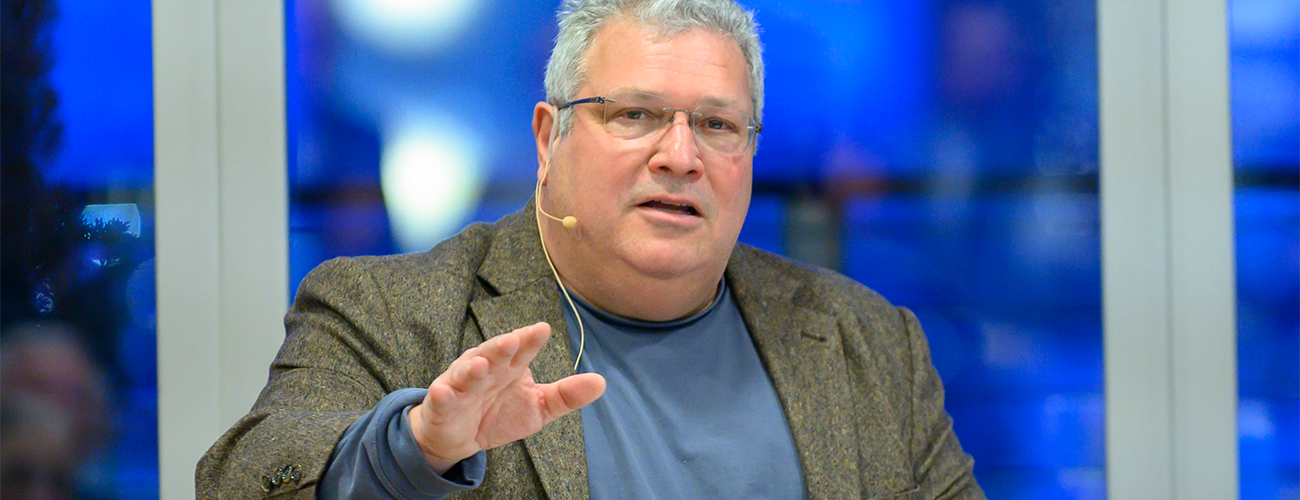The widening appeal of strongman authoritarian rule is undermining traditional liberal governance, historian Robert Kagan said, speaking at a March 28th IPI Distinguished Author Series discussion of his new book The Jungle Grows Back: America and Our Imperiled World.
“We see it in Europe, we see it around the world in the rise of nationalism, in tribalism, and we see it, of course, in the United States,” he said. “And for the first time in American history, an American administration actively sides with opponents of the liberal international order.”
He argued that over the last seven decades this order had kept the world free of world wars, great power conflicts, and depressions, and he likened it to a garden, which, if neglected and untended, would revert to the uncontrollable status of a jungle. “The problem is not that it is growing back because it’s inevitable,” he said. “The problem is we are not resisting the jungle as we did before – that we are not gardening in the way we have for 75 years.”
Behind his concern is a conviction that people have taken for granted this period of continuous global economic growth when in fact it has been aberrantly stable when viewed in the continuum of centuries where the historical norm has been towards chaos.
“To me, the question was never, ‘What is it that’s destroying our liberal world order?’ The question is, ‘What can possibly hold it up because it is such a deviation from history.’”
The relative peacefulness of the past 75 years, he theorized, owed to the American security guarantee, the suppression of nationalism, the spread of democracy, and the international free trade regime which allowed Europe to prosper.
“I’m very worried about the trends in Europe,” he said. “It seems that as Europe renationalizes, all the elements that kept the European miracle are under threat now. Every single one of these key planks is now at risk, mostly because of the US, but partly because of what is happening in Europe.”
“Europe is in a crisis of liberalism, and America as well, and unfortunately they’re happening at exactly the same time,” he continued. “What we have seen over the past 15 years is authoritarianism surviving, then getting wind in its sails and now engaging in a full throated and traditional critique of liberalism. The fact is that Trump and his officials make it clear that they are on the side of European nationalists and don’t even support center right parties, and the final part of our perfect storm is that Great Britain has departed the scene as a power of any kind, floating off into the Arctic Ocean.”
He noted the significance of the fact that Europeans drawn to authoritarianism were not doing badly economically. “Instead,” he said, “they’re upset about what they see as an assault on their culture.” And in the United States, he said, there is a concurrent move back to an earlier American isolationism. “Americans are increasingly asking and demanding an answer to the question, ‘Could you please remind us why we are out there doing all this stuff?’”
He predicted that this American disengagement would have serious consequences in Asia. “Japan is not going to go quietly into this good night,” he said. “As soon as they perceive that the US is out of the game in any fundamental way, they are going to renationalize, rearm, go nuclear, and we are going to be back to an Asian set of conflicts. And, by the way,” he added, “so will Korea and India. Asia’s future is Europe’s past, that is where we are heading. That is a recipe for conflict, not for nice gradual Chinese hegemony.”
Asked about the effect of autocratic governance on human rights protections, he said, “Human rights is the essence of liberalism. The protection of individual rights is what makes liberalism liberalism.” And, he said, the menace is universal. “Because of changes in technology, because of social media, and artificial intelligence data collection, all authoritarian regimes are now a threat to everyone’s freedom.”
He said his idea of the liberal world order did not “center around the UN or international law, it centers around the establishment after World War II of a European and Asian security order, the transformation of two autocratic aggressor states, Germany and Japan, into pacific economic democracies.”
Asked by an ambassador in the audience whether he thought the UN was “doing the gardening or is it creating chaos,” he replied, “My basic view is that the international institutions are like the scaffolding around the building. The building holds up the scaffolding, the scaffolding does not hold up the building.”
IPI Senior Adviser Warren Hoge moderated the discussion.








